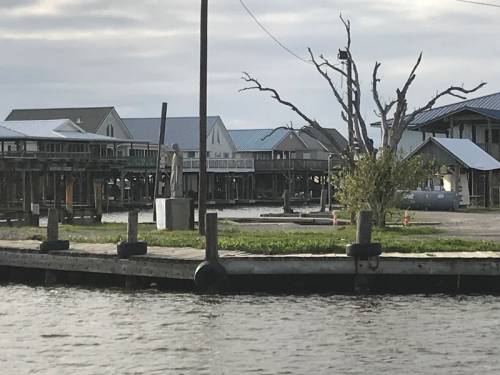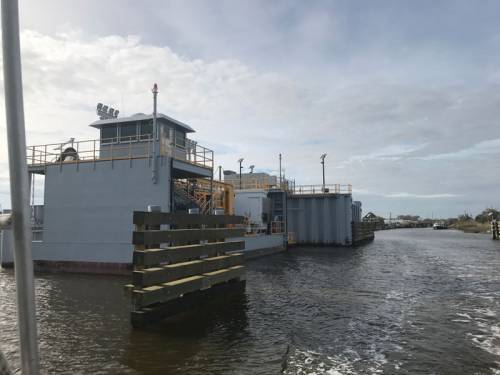MRTI members, staff view environmental challenges along the bayou aboard a fishing vessel
by Mike Ferguson | Presbyterian News Service

During last week’s community engagement trip to New Orleans, the Mission Responsibility Through Investment Committee took in sights of environmental challenges along Blue Bayou aboard a fishing vessel called “The Redeemer.” (Photo by Mike Ferguson)
NEW ORLEANS — Last week during their first day engaging communities in South Louisiana that have been hit hard by natural and human-caused environmental disasters, members of the Mission Responsibility Through Investment Committee took a bayou boat ride courtesy of the Pointe-au-Chien Indian Tribe.
The vessel, appropriately named “The Redeemer,” took committee members and staff with the Office of Faith-Based Investing and Corporate Engagement up and down Blue Bayou. The Rev. Kris Peterson of First Presbyterian Church of Bayou Blue and Chief Shirell Parfait-Dardar of the Grand Caillou/Dulac Band of the Biloxi-Chitimacha-Choctaw Tribe discussed erosion — about a football field of Louisiana coastline vanishes every 90 minutes or so — and the health effects brought on by, among other concerns, 10,000 miles of canals cut through marshes to carry oil and gas across the region.
On top of that are layers of government that sometimes work at a glacial pace. For the two dozen or so passengers, boarding The Redeemer was a one-at-a-time activity; the Pointe-au-Chien tribe has been waiting for three years for a permit to construct a new dock.

The Pointe-au-Chien Indian Tribe hosted the Mission Responsibility Through Investment Committee last week. (Photo by Mike Ferguson)
“We are at the forefront of climate change and every impact,” Parfait-Dardar said, displaying a map of the region’s storm surge — which fits almost exactly the boundaries of Presbytery of South Louisiana, according to Jackie Cummings, the presbytery’s treasurer and the main local organizer of last week’s event.
A storm shuttered the presbytery’s Baton Rouge office in 2016; it took two years before the building was once again ready to be occupied, Cummings said.
A story about Parfait-Dardar’s eight-year-old son speaks to tribal health concerns: As he was brushing his teeth one evening, he cried to his mother, “The water is burning my eyes!”
None of the water got in his eyes, she explained. “The water you brush your teeth with is not supposed to burn your eyes,” she said.
In an effort to stem further coastal erosion, recent work with government scientists, including those with the U.S. Department of Agriculture and its Natural Resources Conservation Service, has “been a blessing, and we hope that continues to grow,” Parfait-Dardar said. “We are working together to bring forth positive change, and at the end of the day, that’s the biggest blessing ever.”

Part of the system of locks constructed along Blue Bayou. (Photo by Mike Ferguson)
The next day, committee members discussed what surprised them about the trip and what they appreciated hearing and seeing. Dr. Steven Webb said the communities “seem less dependent than I thought on the oil and gas industry.”
“I was surprised by how determined they are to stay there,” he said. “I’m not sure I would be.”
“I was really impressed by the resiliency of the communities,” said the Rev. Lindley DeGarmo. “I was also struck by the degree to which they are dependent on a government which doesn’t operate very well.”
“It was infuriating to me that they have to be this resilient,” said the Rev. Denise Anderson, the PMA’s Coordinator for Racial and Intercultural Justice. “I’m so glad they’re surviving, but it’d be nice to see the community not dealing with so much bronchitis and asthma.”
For the Rev. Kerri Allen, the committee’s vice chair and another driving force organizing last week’s trip, the message she heard from several sources was, “We’re not victims.”
“We make assumptions about what’s best for communities without dialoguing with the community,” she said. “How does this help inform our next steps, including conversations with corporations? The issues these communities raised may not be at the forefront in how we are engaging, and so we may need to make some adjustments.”

Shafts of sunlight illuminate a sliver of Blue Bayou. (Photo by Mike Ferguson)
Cummings, the local organizer, wore a smile throughout the committee’s time in her presbytery — time that included a delicious crawfish meal Friday evening at Jefferson Presbyterian Church in Jefferson Parish, west of New Orleans.
“I thank you,” she told committee members, “for coming here and experiencing our lives.”
![]() You may freely reuse and distribute this article in its entirety for non-commercial purposes in any medium. Please include author attribution, photography credits, and a link to the original article. This work is licensed under a Creative Commons Attribution-NonCommercial-NoDeratives 4.0 International License.
You may freely reuse and distribute this article in its entirety for non-commercial purposes in any medium. Please include author attribution, photography credits, and a link to the original article. This work is licensed under a Creative Commons Attribution-NonCommercial-NoDeratives 4.0 International License.
Categories: Racial Justice, Responsible Investing
Tags: chief shirell parfait-dardar, committee on mission responsibility through investment, first presbyterian church of bayou blue, grand caillou/dulac band, jefferson presbyterian church, pointe-au-chien indian tribe, rev. kris peterson
Ministries: Office of Faith-Based Investing and Shareholder Engagement, Racial Equity & Women’s Intercultural Ministries